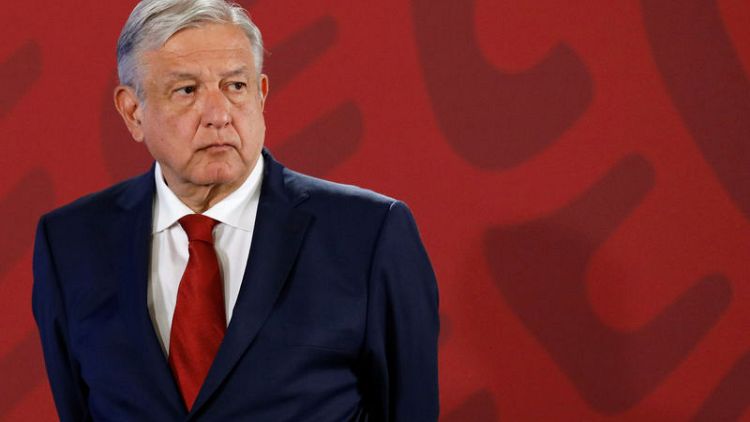By Dave Graham
MEXICO CITY (Reuters) - A fight among leaders of President Andres Manuel Lopez Obrador's ruling party is unlikely to weaken his iron grip on the country, but the row has also underlined how fragile the political legacy he is seeking to build may be.
Smashing the opposition with a landslide victory last year, Lopez Obrador became the first leftist to rule the country in decades. He promised to root out corruption and inequality in what he terms the "fourth transformation" of Mexico.
However, this week tensions between the two most prominent senators of Lopez Obrador's National Regeneration Movement (MORENA) erupted into the open when one angrily accused the other of engineering his removal as head of the Senate.
The squabble has exposed deep divisions inside MORENA, a broad coalition initially forged around leftwing dissidents dedicated to supporting Lopez Obrador's third presidential bid last year.
Senate President Marti Batres excoriated colleague Ricardo Monreal for "stabbing him in the back", claiming the head of MORENA's Senate parliamentary group leant on lawmakers to ensure Batres lost his re-election bid to another MORENA senator.
"He has pursued me and fought me for months, treating me like an enemy," Batres told a news conference after the vote. "He's shown himself to be a factious politician, incapable of heading a pluralist movement, incapable of co-existing in diversity, incapable of sharing political responsibilities."
Monreal, a veteran political operator with decades of experience in public life, described the Senate row as "normal disagreements in democratic processes."
But he came under fire from some quarters in MORENA, including party leader Yeidckol Polevnsky, who backed Batres and urged Monreal to display "more political ethics."
Only obtaining its party registration in 2014, MORENA had extended its base to include disgruntled conservatives and centrists by the time Lopez Obrador won the July 2018 election. It is now the dominant force in both houses of Congress.
MORENA's appeal was that it represented a fresh start after years of discontent with the established parties, said Senator Gustavo Madero of the centre-right National Action Party (PAN).
But it is cast in the image of its maker. "It's strength and its weakness is Andres Manuel Lopez Obrador," said Madero.
The Senate spat is unlikely to hurt Lopez Obrador because it is he, not MORENA, that dictates the political agenda, said Jorge Buendia, head of polling firm Buendia & Laredo.
Electoral self-interest could be incentive enough for MORENA to patch up its differences. But if the party cannot stay united without Lopez Obrador, his plans to use welfare spending to build a fairer society in Mexico could crumble when his six-year term ends if Morena loses power, Buendia added.
"The worst-case scenario (for Lopez Obrador) is that there would be a change of government," Buendia said.
The president himself has sought to remain above the fray.
"Those of us who are dedicated to the noble office of politics, we have to put ideals and principles first," he told a news conference when asked about the Senate row. "It's not the posts that should matter; it's the contribution to change."
BREAKING GLASS
Analysts say the dispute offers a foretaste of the battles to come when Lopez Obrador exits the stage in 2024 if he does not try to change the constitution to allow him to seek a second term. He has repeatedly pledged that he will not run again.
Still, he has continued to hold campaign-style rallies up and down the country, and he plans to test his electoral strength again in 2021 by holding a so-called "recall" referendum on his presidency to coincide with mid-term legislative elections.
Like his U.S. counterpart President Donald Trump, Lopez Obrador dominates the political movement that catapulted him to power, and the most powerful figures in the government owe their positions to his patronage.
Monreal and Batres have been Lopez Obrador allies for years, and both are regarded as possible contenders within the party for the presidency in 2024. Others include Foreign Minister Marcelo Ebrard, who succeeded Lopez Obrador as mayor of Mexico City, and the current Mayor Claudia Sheinbaum.
Monreal belonged to several parties before MORENA and stayed loyal to the long-ruling Institutional Revolutionary Party (PRI) for years after Lopez Obrador had left the PRI to help found the Party of the Democratic Revolution (PRD) in 1989.
Until MORENA's creation, the PRD was the main leftist force in Mexico.
Batres' allegiances have remained closely in step with the president, and he served as the first president of MORENA.
MORENA now incorporates much of what was the PRD, but the Mexican Left has long been notoriously fractious. As the pre-eminent leftist leader in the country for years, Lopez Obrador has been one of its few unifying elements.
"Once he loses strength, this movement MORENA will break like glass into a thousand pieces," said Jesus Ortega, a onetime chairman of the PRD, and former ally of Lopez Obrador.
(Reporting by Dave Graham; Editing by Daniel Flynn and Lisa Shumaker)
